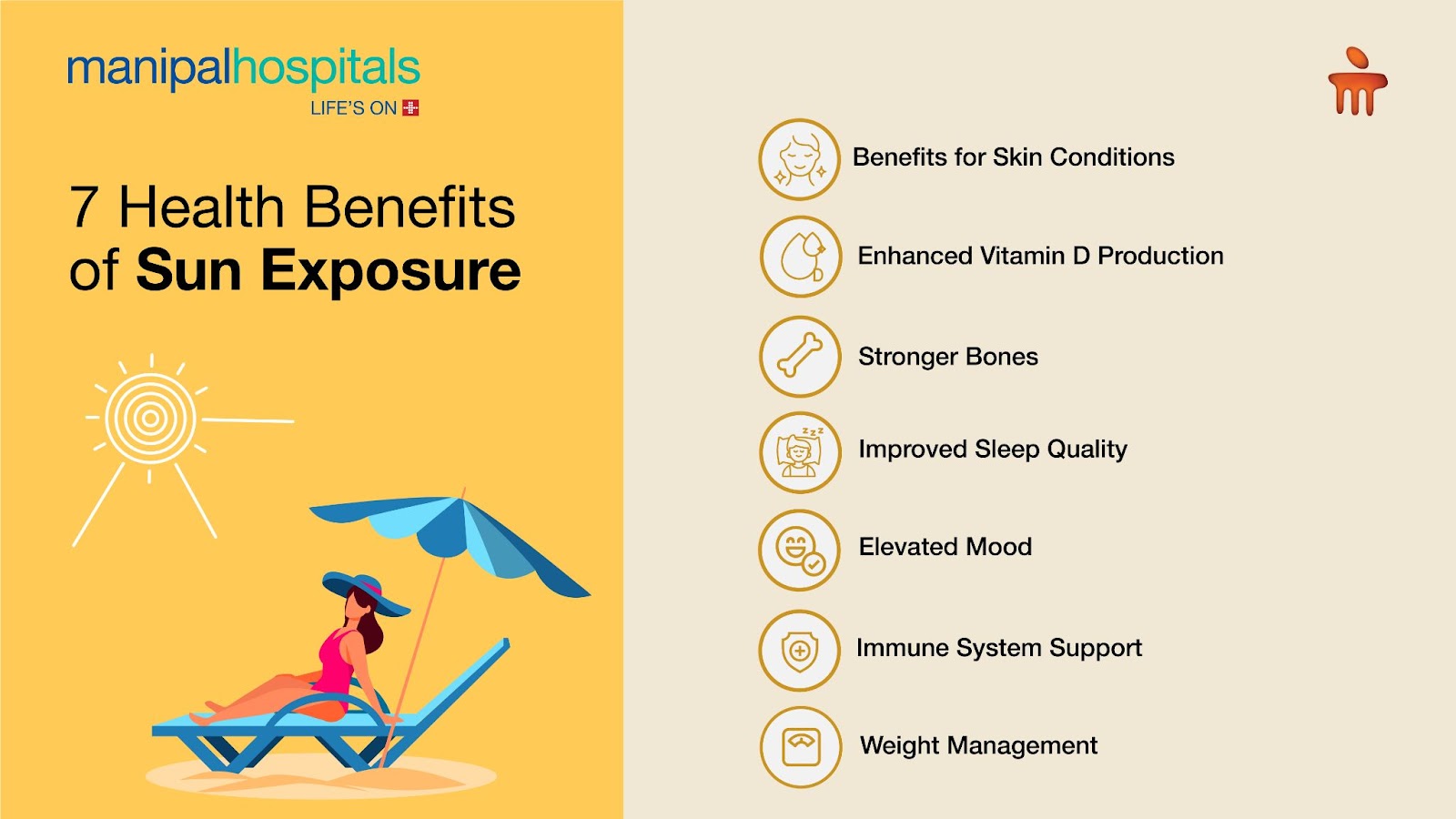
We all crave the warmth of morning sunlight on our skin, that feeling of rejuvenation that comes with spending time outdoors. But beyond the perfect tan (although that can be a perk!), sunlight offers a surprising array of health benefits. From boosting your mood to strengthening your bones, controlled sun exposure can be a powerful tool for promoting overall well-being.
In this blog post, we have given the science behind the benefits of sun exposure and provided you with the knowledge to safely harness the power of the sun. So, ditch the dull and embrace the sunshine (safely, of course!) as we explore how to make sunbathing a healthy habit.
Synopsis
Health Benefits of Sun Exposure

Moderate sun exposure can provide several health benefits, including:
1. Enhanced Vitamin D Production
Sunlight is the primary source of vitamin D, essential for bone health, immune function, and mood regulation. Vitamin D deficiency has been linked to various health problems, so getting some sun exposure can be a natural preventative measure.
2. Stronger Bones
Vitamin D aids the body in absorbing calcium, another crucial bone mineral. Regular, moderate sun exposure can help maintain strong bones and reduce the risk of osteoporosis.
3. Improved Sleep Quality
Sun exposure helps regulate the circadian rhythm, the body's natural sleep-wake cycle. Early morning sun exposure can promote daytime alertness and improve sleep quality at night.
4. Elevated Mood
Sunlight exposure increases serotonin production, a neurotransmitter that regulates mood and promotes feelings of well-being. This can help combat stress and even alleviate symptoms of seasonal affective disorder (SAD).
5. Potential Immune System Support
Studies suggest moderate sun exposure may enhance white blood cell production, which strengthens the body's defence against infections and illnesses.
6. Possible Role in Weight Management
Some evidence suggests that sunlight exposure might play a role in weight management by influencing leptin, a hormone that regulates feelings of hunger and satiety. Additionally, spending time outdoors often involves physical activity, which contributes to overall weight control.
7. Benefits for Certain Skin Conditions
Sunlight exposure can be beneficial for some skin conditions like psoriasis and eczema. However, it's important to be mindful, as excessive sun exposure can worsen these conditions.
How to Take a Sunbath Safely?
To reap the benefits of Early morning sunlight while minimising risks, follow these sunbathing safety practices:
- Limit Sun Exposure During Peak Hours: Avoid sunbathing during peak sun hours (typically 10 am to 4 pm) when UV rays are strongest. Opt for early morning or late afternoon sun exposure.
- Protective Clothing: Wear loose-fitting, long-sleeved clothing made from breathable fabrics to protect your skin. Additionally, a wide-brimmed hat and sunglasses are essential for added protection.
- Sunscreen is Essential: Apply broad-spectrum sunscreen with SPF 30 or higher liberally and reapply every two hours, or more often if swimming or sweating.
- Seek Shade: Whenever possible, find shade, especially during peak sun hours. Umbrellas, beach tents, or shady areas under trees are your allies.
- Stay Hydrated: Sun exposure can lead to dehydration. Drink plenty of water before, during, and after sunbathing to stay hydrated.
Also Check: How to Shield and Safeguard your Skin from Sun Damage
Precautions to Take While Sunbathing
Here are some additional safety measures to consider:
- Individuals with fair skin burn more easily. Limit sun exposure and use higher SPF sunscreen.
- Certain medications can increase sun sensitivity. Consult your doctor if you have any concerns.
- Regularly examine your skin for any changes in moles or unusual spots.
- If you experience any discomfort like dizziness, nausea, or severe sunburn, get out of the sun immediately and seek medical attention if needed.
FAQ's
The ideal amount of sun exposure can vary depending on your skin type, location, and time of year. Generally, 15-20 minutes of unprotected sun exposure on your face and arms a few times a week is sufficient for vitamin D production. However, it's always best to consult your doctor for personalised advice.
While some foods contain vitamin D, it's difficult to get enough solely through diet. Sun exposure remains a primary source.
You can still get some vitamin D from the sun even on cloudy days. However, the amount will be less compared to a clear day.
Sunlight exposure has many health benefits including getting vitamin D, strengthening the immune system, reducing high blood pressure, and improving mood and sleep quality.





















 3 Min Read
3 Min Read











